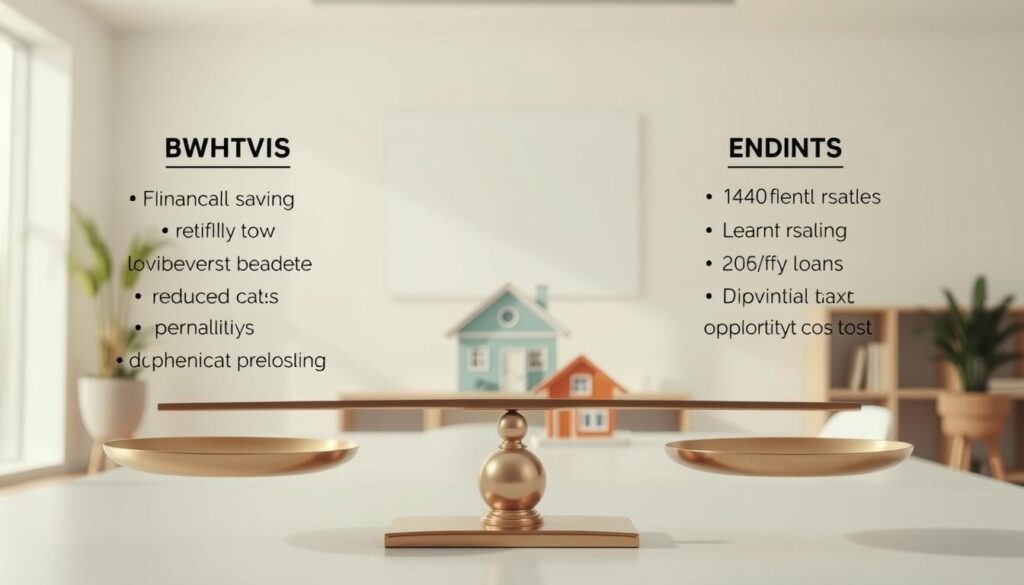Financial emergencies can pop up without warning, leaving us wondering how to cover urgent costs. One option is using retirement funds, but it’s a choice that needs careful thought.
Recent data shows many people have thought about or taken a loan from their 401(k) to handle financial troubles. While it might seem like a good solution, it’s important to understand the full picture.
When facing financial challenges, it’s key to consider the pros and cons of tapping into your retirement savings. Make this decision with a clear head, knowing how it might affect your future finances.
Key Takeaways
- Using retirement funds can be a viable option during financial emergencies.
- Careful consideration is necessary before making a decision.
- The maximum loan amount is typically $50,000 or 50% of the vested account balance.
- Repayment periods usually span five years, with exceptions for primary residence purchases.
- Loans are borrowed tax-free, but repayments are made with after-tax dollars.
Understanding401(k) Loans: The Basics
A 401(k) loan lets you borrow from your retirement savings. It’s useful in times of need. But, it’s important to know how it works and its terms.
What Is a 401(k) Loan?
A 401(k) loan lets you borrow from your own retirement savings. It’s not like a regular loan. You borrow from yourself. This is good because it often doesn’t check your credit and has better interest rates.
How 401(k) Loans Work
Getting a 401(k) loan is easy. You ask your plan administrator for a loan amount. Then, you repay it through payroll deductions. The interest goes back into your 401(k).
General Limits and Terms
The IRS sets rules for 401(k) loans. This includes how much you can borrow and how to repay it.
Maximum Borrowing Amounts
You can borrow up to $50,000 or 50% of your vested balance. For example, if you have $100,000, you can borrow $50,000.
Typical Repayment Periods
Most loans must be repaid in five years. But, if it’s for a home, you might have more time.
| Loan Amount | Repayment Period | Interest Rate |
|---|---|---|
| Up to $50,000 or 50% of vested balance | Typically 5 years; longer for primary residence | Varies by plan, often around 5% |
Financial expert Jeanette Garretty says, “Borrowing from your 401(k) can be good for big expenses or emergencies. But, think about how it affects your retirement savings.”
“The key to using a 401(k) loan effectively is understanding the terms and ensuring you can repay the loan without jeopardizing your retirement goals.”
The Pros and Cons of Borrowing From Your Retirement
It’s important to know the pros and cons of taking a 401(k) loan. This option can help with financial needs, but you must consider both sides.
Advantages of 401(k) Loans
One big plus is that 401(k) loans don’t need a credit check. This is great for those with poor credit.
No Credit Check Required
Unlike regular loans, 401(k) loans don’t look at your credit score. This is helpful for those who can’t get loans because of bad credit.
Paying Interest to Yourself
Another good thing is that the interest goes back into your 401(k). So, you’re paying interest to yourself, not a bank.
Potential Drawbacks to Consider
While 401(k) loans have benefits, there are downsides too.
Opportunity Cost of Investments
Using your 401(k) for a loan means missing out on investments. The money you borrow isn’t growing in the market.
Repayment Obligations
You must pay back the loan, usually within 5 years. Not repaying can lead to penalties and taxes.
Tax Implications
Think about the taxes when taking a 401(k) loan. If you can’t pay it back or leave your job, you might face income tax and a 10% penalty if under 59 1/2.

In summary, taking a 401(k) loan is a careful choice. It has benefits like no credit checks and interest repayment. But, it also has drawbacks like missed investment chances and tax issues. Weighing these points is key to making a smart financial decision.
Home Purchase: Using Your401(k) for Down Payment
Using 401(k) funds for a home down payment is both tempting and scary. It’s a big help since you don’t need mortgage insurance or strict loan rules. But, it means using your retirement money, which is key for your future.
Benefits of Using Retirement Funds for Homebuying
Using 401(k) for a down payment is great, especially for first-timers. It lets you put down more money. This can lower your mortgage and monthly payments.
First-Time Homebuyer Considerations
First-time buyers should think hard about using 401(k) funds. It’s a good option, but it’s important to think about how it affects your retirement and loan terms.
Repayment Strategies for Home Purchases
Repaying a 401(k) loan for a home needs a smart plan. Here are some tips:
Budgeting for Loan Repayments
Make sure to plan for loan payments to avoid missing them. The repayment time for a 401(k) loan for a main home can be up to 30 years. But, it’s usually much quicker, often just 5 years.
Tax Deduction Considerations
Even though you pay taxes on 401(k) loan repayments, the interest isn’t tax-deductible unless it’s for a main home. Knowing this is key.
| Repayment Term | Monthly Repayment | Total Interest Paid |
|---|---|---|
| 5 Years | $200 | $1,200 |
| 10 Years | $100 | $2,400 |
Education Expenses: Funding College with401(k) Funds
The cost of college is rising fast. Many families are looking for new ways to pay for it. Using 401(k) funds is one idea that’s getting attention. But is it a good choice?
Comparing 401(k) Loans vs. Student Loans
There are two main ways to fund college: 401(k) loans and student loans. 401(k) loans let you borrow from your retirement savings at a lower rate. But think about how it might affect your retirement savings.
- Pros of 401(k) Loans: Lower interest rates, possibly tax-free if repaid correctly.
- Cons of 401(k) Loans: Could reduce your retirement savings, and might have penalties if not repaid.
When It Makes Sense for Education
Using 401(k) funds for college can be smart in some cases. For example, when you can’t find other ways to pay. But, you must think about how it might affect your retirement.
Alternative Education Funding Options
Before using 401(k), look at other ways to fund your education.
529 Plans
529 Plans are special savings plans for college. They offer tax benefits and flexibility.
Scholarships and Grants
Check out scholarships and grants for extra money. They don’t need to be paid back. They can be based on merit or need.

Choosing how to fund college is a big decision. While 401(k) loans are an option, it’s important to look at all your choices carefully.
Debt Consolidation: Tackling High-Interest Debt
Using a 401(k) loan for debt consolidation can lead to financial stability. It helps those with many high-interest debts. This method simplifies finances and lowers interest costs.
Using 401(k) Loans to Eliminate Credit Card Debt
One big plus of 401(k) loans for debt consolidation is getting rid of high-interest credit card debt. By rolling these debts into one loan with a lower rate, you save on interest. Plus, your monthly payments get easier to manage.
Interest Rate Advantages
401(k) loans usually have lower interest rates than credit cards. This can save a lot of money over time. For example, moving $10,000 in debt from an 18% credit card to a 4% 401(k) loan saves a lot on interest.
| Debt Type | Interest Rate | Monthly Payment |
|---|---|---|
| Credit Card | 18% | $200 |
| 401(k) Loan | 4% | $100 |
Creating a Repayment Plan
Creating a solid repayment plan is key in debt consolidation. It should detail the loan amount, interest rate, and how long to pay it back. A clear plan helps you stay on track and avoid new debt.
Avoiding New Debt Accumulation
To successfully consolidate debt, avoid taking on new debt. Cut unnecessary expenses, build an emergency fund, and steer clear of new credit checks.
Financial Discipline Strategies
Financial discipline is crucial. Use budgeting and track your expenses to stick to your plan. As financial expert Dave Ramsey says, “Winning at money is 80% behavior and 20% math.”
“The key to financial freedom is to be consistent and patient. It’s not about being perfect; it’s about making progress.”
By following these strategies and staying committed to financial discipline, you can effectively use 401(k) loans for debt consolidation. This path leads to a more stable financial future.
Emergency Expenses: When You Need Funds Fast
Financial emergencies can hit anyone at any time. Being ready is crucial. When unexpected costs arise, people look for ways to cover them.
Defining True Financial Emergencies
A true financial emergency is an urgent expense, like medical bills or sudden home repairs. It’s important to know the difference between emergencies and non-essential spending. This helps make better financial choices.
Weighing 401(k) Loans Against Other Emergency Options
When a financial crisis strikes, some turn to 401(k) loans. But, it’s important to compare this with other options, like personal loans or emergency savings.
| Option | Pros | Cons |
|---|---|---|
| 401(k) Loan | Low interest rates, no credit check | Potential impact on retirement savings, repayment terms |
| Personal Loan | Flexibility in use, potentially lower interest rates | Credit check required, potential for higher interest rates |
| Emergency Savings | No repayment needed, no interest charges | May not be enough for big expenses, needs discipline to grow |
Building an Emergency Fund to Avoid Future Loans
Building an emergency fund helps avoid 401(k) loans. It’s about setting savings goals and making automatic transfers.
Setting Savings Goals
Start by setting a realistic goal for your emergency fund. Aim for 3-6 months’ worth of living expenses.
Automating Emergency Savings
Automate your savings by setting up regular transfers from your checking to your savings or emergency fund.
Key Borrowing401(k) Loan Reasons to Consider
When you’re facing financial troubles, knowing why you might borrow from your 401(k) is key. It can be a smart move in certain situations. It offers financial help or helps you avoid worse penalties.
Financial Hardship Situations
In times of financial hardship, a 401(k) loan can be a lifesaver. This includes medical emergencies, foreclosure, or other sudden costs. It helps you get through tough times without losing your savings.
Major Life Events
Major life events like buying a home, paying for education, or covering divorce costs are valid reasons. These big expenses can be overwhelming. A 401(k) loan can make them more manageable.
Avoiding Early Withdrawal Penalties
Another good reason for a 401(k) loan is to avoid early withdrawal penalties. If you need cash before retirement, taking it out can cost a lot in penalties and taxes. A loan lets you get your money without these extra costs.
Comparing Loans vs. Hardship Withdrawals
Choosing between a loan and a hardship withdrawal from your 401(k) is important. Loans usually have better terms, like no taxes or penalties on the borrowed amount.
Tax Savings Potential
Borrowing from your 401(k) also means tax savings potential. Unlike regular loans, 401(k) loans don’t make you pay income tax on the borrowed amount. This can save you a lot, especially if you’re in a high tax bracket.
In summary, borrowing from your 401(k) can be wise in certain situations. This includes financial hardship, big life events, or to dodge early withdrawal penalties. Knowing these key borrowing reasons helps you make smart choices about your retirement savings.
The401(k) Loan Application Process
The 401(k) loan application process can differ by employer. Yet, there are common steps you’ll find. Knowing these can make your application smoother.
Required Documentation
You’ll likely need to show your ID, proof of work, and how much you want to borrow. Some plans might ask for more, like financial statements or why you need the loan.
Employer-Specific Requirements
Every employer’s 401(k) plan has its own rules for loan applications. This includes specific forms, deadlines, and how they approve loans. Always check with your HR or plan administrator to know what’s needed.
Processing Timeframes
The time to process a 401(k) loan varies a lot. Some employers offer fast service for a fee, while others take longer, from days to weeks.
Expedited Options
If you need money fast, some plans offer quick processing. This is great for urgent financial needs.
Digital Application Methods
Many employers now have online or mobile apps for loan applications. These make applying and tracking your application easier and quicker.
| Application Method | Processing Time | Additional Fees |
|---|---|---|
| Standard | 1-3 weeks | No |
| Expedited | 3-7 days | Yes |
| Digital | 1-5 days | Variable |
Financial expert Jeanette Garretty says, “Understanding your 401(k) plan’s terms is key to a successful loan application.” This shows how crucial it is to be well-informed during the process.
Risks and Consequences of401(k) Borrowing
It’s important to know the risks of borrowing from your 401(k). This can affect your financial health a lot. It’s especially true when you lose your job, see your retirement savings drop, and worry about double taxation.
Job Loss Scenarios
If you lose your job, you’ll face accelerated repayment requirements for your 401(k) loan. You’ll need to pay back the loan fast, usually within a short time. If you don’t, you’ll face penalties.
Accelerated Repayment Requirements
When you lose your job, the loan balance is due right away. Not paying it back can lead to tax penalties and more financial stress.
Default Consequences
Defaulting on a 401(k) loan can cause big tax problems. You’ll face penalties and taxes on the loan balance you still owe.
Impact on Retirement Savings
Borrowing from your 401(k) can hurt your retirement readiness. The money you borrow isn’t growing in your retirement account. This means you might miss out on compound interest.
Compound Growth Calculations
The interest you miss out on can really cut down your retirement savings over time.
Retirement Readiness Assessment
It’s key to check how borrowing impacts your retirement goals. You might need to adjust your savings plan.
Double Taxation Concerns
When you borrow from your 401(k), you use money you’ve already taxed. Then, in retirement, you’ll be taxed again on withdrawals. This double taxation can reduce your retirement income.
Conclusion: Making the Right Decision About Your Retirement Funds
Deciding to borrow from your 401(k) needs careful thought. You must weigh the good sides against the bad, like taxes and how it affects your future savings.
We’ve looked at times when taking a 401(k) loan might be smart. This includes buying a home, paying for school, combining debts, or covering urgent needs. Each case needs a deep look at your money situation and goals.
Good money management means looking at other choices and knowing 401(k) loan rules. This helps you choose wisely, keeping your financial future in mind.
In the end, borrowing from your 401(k) should help your financial health and retirement dreams. It’s key to understand the full picture and what might happen next.





